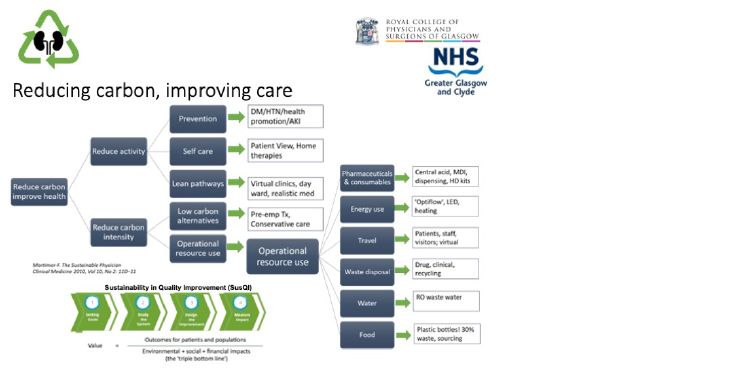Improving the Environmental Sustainability of the Glasgow Renal Unit
A department-wide, multi-disciplinary initiative underway to improve the environmental sustainability of the Glasgow Renal Unit. Kidney care has a particularly large carbon footprint, and climate change also has significant implications for provision of kidney care.
This trainee-initiated and led project has set up am environmental sustainability committee. We now have representation from dialysis and ward nursing, management, consultants, and technicians. We have a variety of Sustainable QI projects underway, targeting improved value with regard to greenhouse gas emissions, financial cost, and patient outcomes. We have additionally undertaken education and engagement events and have forged collaborative relationships with other departments within NHS GGC, Scotland, and the UK.

We would encourage all trainees to consider their own professional and moral obligation to countering climate emergency. This is often as simple as considering the environmental impact of any QI project undertaken, in-line with GMC, NHS Scotland, and Royal College guidance. Further engagement with environmental sustainability may include learning and education (resources are appended), or undertaking sustainability-specific projects, examples from our own department relate to the following themes:
- Lessening demand on single use consumables: a medicine pot per patient, rather than per drug-round is something we are trialling on renal wards. An external example we hope to emulate comes from Great Ormond Street Hospital IPC team, saving 21 tonnes of plastic through rationalising glove use to situations of "bodily fluid, non-intact skin, or mucus membrane" only.
- Lean pathways: within our department, carbon savings come from use of Day-ward in preference to hospital admissions, e-vetting referrals, and one-stop clinics to reduce additional patient journeys. Use of a flow diagram to assess a typical patient journey through a department can highlight inefficient resource use or low-carbon alternatives for care delivery, an example we undertook being the introduction of 'incremental dialysis' an individualised dialysis prescription requiring fewer sessions initially.
- Education and engagement - We have delivered local and national teaching sessions, incorporated learning resources into our departmental App, and will present our SusQI work at national conferences. Self-directed learning and engaging others to develop a community of practice is a good place to start though, either to achieve a stand-alone project, or to set up a departmental working group to create a longer-term environmental strategy.
Resources for incorporating environmental sustainability into your own QI work of wider practice:
- Centre for Sustainable Healthcare (CSH): Short courses in sustainability, health and healthcare, QI support (susqi.org), blogs, discussion pages, etc.
- Environmentally Sustainable Healthcare - eLearning for healthcare (e-lfh.org.uk)
- Webinars from RCPSG, RCPE, and RSM (available via YouTube)
- Your local NHS environmental sustainability manager
- Or get in touch: eleanor.murray3@nhs.scot @E_C_Murray
